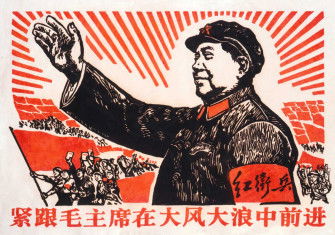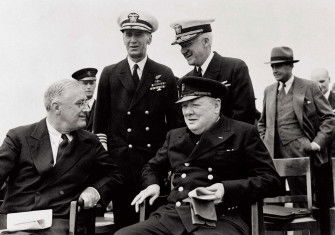Personality Flaws
Do leaders and leadership matter most at times of crisis?

According to Karl Marx, ‘Men make their own history, but not as they please, in conditions of their own choosing, but rather under those directly encountered, given and inherited.’ Or as Harold Macmillan put it: ‘Events, dear boy, events.’ While the Marxist aphorism may seem incontrovertible, the granular relationship between individual actors and the quotidian drama of actual history is contentious. Does history explain the role of leaders or do the actions of leaders explain history? It is the study of ‘Great Men’ versus contemporary, materialist history, which demotes the individual, however charismatic, to focus on collective movements.
Introducing his unsurpassed 1998 study of Hitler, Ian Kershaw confessed that biography ‘never [previously] figured in my intellectual plans’. In it he discovered a Hitler who was a lazy underachiever with a gift for oratory – who stood at the apex of a state that, instead of being an expression of the leader’s will, was crammed with competitive power brokers. Tyranny, war and genocide reflected Hitler’s malign intent, to be sure, but as joint enterprises.
Has Kershaw given in to the biography bug in his new book? He is far too sophisticated a historian to go full pelt. His thesis is that leaders and leadership matter most at times of crisis. Subtly, Kershaw juxtaposes leaders such as Stalin and Hitler who exercised untrammelled and murderous power with less malign figures: Churchill, Thatcher and Kohl, who all confronted crunch moments.
Unfortunately, the scope of the book dilutes its purpose. It is both too broad and too narrow. Rather than interrogating whether or not ‘personality’ is truly a useful concept for historians, Kershaw plunges into rather airless accounts of how the personalities of Hitler, Lenin, Churchill or Franco reshaped history and/or unleashed destructive wars and crimes against humanity. As a consequence, his argument becomes circular and self-fulfilling. It is disappointing that Kershaw chose such a resolutely Eurocentric ‘line up’ – not a single African, Asian or American leader is considered worthy of analysis. The Second World War was a global struggle and this European focus seems narrow, even claustrophobic.
Kershaw frames his potted biographies as a means to pin down the interaction of personality and the seizure and use of political power, but it is unclear what conclusions are drawn other than the truism that periods of crisis benefit power-crazed opportunists. It is simply not possible to detach ‘personality’ from the efforts of propagandists to manufacture leadership cults. Kershaw alludes to Lucy Riall’s highly original study of Garibaldi, but he fails to provide comparable insights by over-personalising complex historical developments. Riall showed that the ‘greatness’ of Garibaldi as a heroic leader was the brainchild of Giuseppe Mazzini, whose propaganda provided a model for Joseph Goebbels. In politics, personality is manufactured – not a precondition of power.
Kershaw concludes his introduction with a plea for managerial, uncharismatic leadership. And yet even in contemporary British politics, the influence of personality is only clear to tabloid headline writers. Boris Johnson’s claims of ‘delivering’ or ‘getting on with the job’ are the politics of overheated air not the triumph of ‘personality’. Regrettably, at the end of Personality and Power readers may be left confused rather than enlightened about the meaning of personality and its role in history.
Personality and Power: Builders and Destroyers of Modern Europe
Ian Kershaw
Allen Lane 512pp £30
Buy from bookshop.org (affiliate link)
Christopher Hale is the author of Deception: How the Nazis Tricked the Last Jews of Europe (History Press, 2019) and A Brief History of Singapore and Malaysia (Tuttle, 2023).






